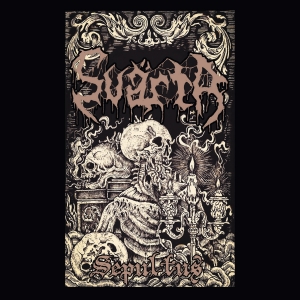
Almost one year after the fabulous demo-tape På Förtvivlans Krön (see update November 10th 2014), Sweden’s devastating army Svärta return with six (mainly lengthy; i.e. in between four and nine minutes) new epics in order to continue their up-marching sonic terror. Be grateful, dear listener, because that former release was quite impressive (I gave it a 90/100-score). For the release of Sepultus, Svärta joined the roster of A Sad Sadness Song, which is one of the sub-divisions of Aeternitas Tenebrarum Musicae Fundamentum.
Sepultus opens with Bråddjupets Kall, which surprises me from the beginning, and this is why. The demonstrational recording I mentioned was pretty slow-paced in general, but this opening track opens quite fierce, fast and energetic. Okay, the demo consisted of some faster pieces too, but opening this album with the other angle of speed is somewhat confusing. But nevertheless it does sound great, honestly! And it’s only the first sequence, because after about three minutes, the furious outburst transforms into an integer, down-earthed acoustic piece of melancholy. And the last part of this opening track indeed exhales the greatness once offered by På Förtvivlans Krön, for being based on epic leads and an oppressive execution. Yet since the second track, Hädanfärdens Sigill, also opens the speed-up way, one might already conclude that the inherent change, when talking about the speed, must be true, must be a next step into this band’s evolution. Why not anyway?... The victorious riffing and forceful rhythm section remain a driving power behind Svärta’s compositions, and so do the many tempo-changes, breaks and (acoustic) intermezzi, but one must not deny the importance of the vocal part too, for this is truly cult.
Besides the faster, much faster approach of these new songs (generally seen, for there are still many decelerating passages), not that much did change fundamentally. The main structures are based on traditional elements at the one hand –cf. the Second Wave trend– and at the same time there is a certain, surreptitiously hidden progression too, bending over towards some secret modernistic mood. The addition of (semi) acoustic passages is still very hot, and truly fitting. As a matter of fact, once again I have about nothing but superlatives to add. And then, canalising my thoughts in order to conclude, I just need to mention the production, which is little under-produced and not that wonderfully mixed, but in this approach’s case it does not bother at all. Besides there are quite some excellent extras, like the many changes in tempo, melody or structure (as mentioned before), the hypnotic intermezzo Gift, or the trans-psychic end of Förruttnelsens Ljuva Nektar.
